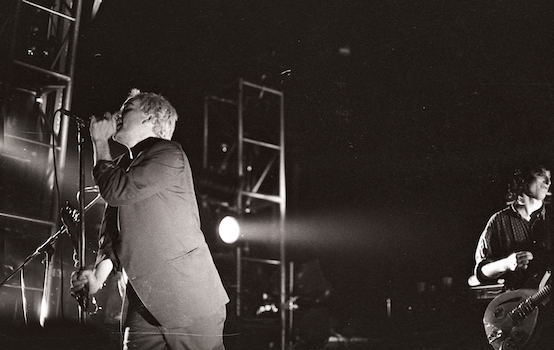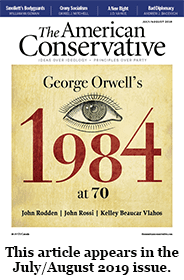R.E.M. in the U.S.A.

Begin the Begin: R.E.M.’s Early Years, Robert Dean Lurie, Verse Chorus Press, 288 pages
Though their star in our cultural firmament has dimmed a bit in the last couple of decades, at one point in the early 1990s, R.E.M. were arguably the most important and influential American rock band. They practically invented the genre of indie rock, and for egg-headed music obsessives of a certain age, few bands continue to inspire such remarkable devotion. At the same time, few rock musicians have been as deliberately opaque and contradictory about their art and personal lives as R.E.M. have. The hunger to connect with audiences usually makes rock stars something of an open book; between R.E.M.’s indecipherable lyrics, slow rise to fame, and personal eccentricities, they’re a bit more like the Voynich manuscript, and God help you if you wanted to write an actual book about the band. A number of people have tried, but none of the books to date amount to much more than fan service.
This brings us to the latest attempt, Robert Dean Lurie’s Begin the Begin: R.E.M.’s Early Years. Appropriately enough, Lurie begins the book by gently noting some of the inadequacies of previous R.E.M. books. Specifically, a number of the previous bios were written by British authors with no good sense of place. R.E.M.’s story is in many respects part of the broader story of the late 1970s, early 1980s Athens, Georgia music scene—which also produced The B-52’s, and a slew of lesser known but highly influential groups like Pylon. Further, there are any number of very uniquely southern cultural influences on the band that, bless their hearts, are likely to be lost on foreign biographers.
It helps that Lurie knows the terrain exceptionally well. He attended the University of Georgia in Athens in the early 1990s when the band was at the height of their fame but still called the sleepy college town home. His sense of the place is such that, after a few chapters, you can practically see the kudzu growing on the pages, and his personal connections with the town mean he easily ingratiated himself with a number of the band’s friends and old associates—people that at one point in the book he aptly dubs “holy fools” because they are eccentric and interesting in their own right.
Dealing with the holy fools is a smart strategy for no other reason than that they’re more likely to tell an accurate story than a band that’s notorious for misleading journalists with a slew of hyperbole and half-truths. Perhaps the band did this because they found it amusing or it provided them with a degree of privacy, but the result is that nearly 40 years and millions of records after they first started making music, a lot of basic facts about the band remain unknown.
In his obsessive quest to understand R.E.M.’s milieu, Lurie walks a fine line between screwy and scrupulous. For instance, there’s an interesting, if discursive, few pages on how Georgia’s post-civil rights school busing policies in the 1970s may have affected the outlook of band members and various hangers-on. But then there are times when Lurie hits absolute paydirt.
In chapter five, during an interview with “Ort,” a colorful Athens denizen, craft beer expert, and old band friend, he explains to Lurie that the band’s name doesn’t stand for “Rapid Eye Movement.” They actually named themselves after Ralph Eugene Meatyard, a Kentucky photographer of enough repute that he once photographed Thomas Merton. But Meatyard was best known for his unsettling and blurry black and white photos of subjects, often his own children, standing around in the woods wearing Halloween masks. Notably, he signed his letters with a lowercase “r.e.m.”—exactly the way it appeared on the band’s early concert posters and albums.
To say that this is exactly the kind of southern gothic outsider art that UGA art major and R.E.M. lead singer Michael Stipe was into is an understatement and a half. And yet, this basic fact about how the band was named remains virtually unknown. As Lurie says half-jokingly, the story is so plausible that he doesn’t want to run it by R.E.M.’s official representatives for fear it will be shot down.
Aside from his time with the holy fools, Lurie also does a good job of reconstructing the influential relationships, romantic and otherwise, that the band had in college and then later as part of the ad hoc artists’ community that they were a part of in the town. Here we learn that the “real R.E.M.—the R.E.M. held so dear by those Athens scenesters of yore—drank, popped pills, snorted stuff, got laid, and worked their asses off.” This provides a lot of refreshing insight; most of the contemporaneous portrayals of the band during their heyday often presented them, Stipe’s mercurial sexuality notwithstanding, as almost ascetic examples of artistic integrity relative to the rock and roll excess of their peers.
And it’s an especially welcome contrast to the image of R.E.M. at the height of their fame, when the band started engaging in a lot of eye-rolling political lectures, a topic that Lurie handles adroitly. He offers critical perspective when warranted, while putting the best construction on the band’s beliefs. Most critics would be tempted to rubber stamp the band’s good intentions and liberal politics, however off-putting they may have been.
As for the part about working their asses off, Lurie offers a helpful chronology of early recordings and tours. On one hand, they were a legendary live act determined to do whatever would engage the audience, even if it meant Stipe dipping his entire head in a bowl of mustard before walking on stage. On the other hand, in spite of their artistic tendencies, they really were the anti-rock band in many respects. Lurie shows in detail how they were diligent, conscious of writing songs people enjoyed, and always chose the career path that led to long-term success, as opposed to immediate financial gain. Despite hosannas from rock critics and modest but respectable album sales, the band didn’t get any meaningful radio airplay until “The One I Love” single from their fifth album, seven years into their career.

But it wasn’t all grit and good choices; the band had some fortunate connections early on. Drummer Bill Berry had a job out of high school working at a record label in Georgia managed by Ian Copeland, the brother of Police drummer Stewart Copeland. Ian Copeland went on to found a major music booking agency, and a handful of opening slots for The Police helped the band’s reputation enormously. The third Copeland brother, Miles, went on to found I.R.S. Records, which signed R.E.M. alongside other artists such as The Go-Go’s, Oingo Boingo, The English Beat, The Bangles, and many others. The Copeland brothers played a huge role in making what would become alternative music commercially viable, and R.E.M. benefited greatly from the Copelands’ ambitions.
As for the band’s actual music, Lurie is often at his best trying to make sense of the band’s famously inscrutable early songs, the lyrics of which can charitably be described as impressionistic gibberish that lend themselves to endless interpretation. Lurie has an MFA and isn’t a journalist per se; he approaches the artistic side of the band from the perspective of one artist making sense of another. He also gamely tracks down the band’s stated and unstated literary influences, which range from Joel Chandler Harris’s Uncle Remus tales to Lawrence Durrell. This results in as much eye-opening detail as obsessed fans can handle. Apparently, “Harborcoat,” the bouncy, Ska-inflected opener on the band’s second album Reckoning, is about some particularly lurid imaginings of the sexual relationship between real life couple Lillian Hellman and Dashiell Hammett—not that you would ever in a million years get that from the song. As Lurie writes, “What the hell is a harborcoat, anyway?”
Lurie does a remarkable job nailing down all of these details. His literary inclinations mean he’s constantly circling his subject, rather than telling a straight account, but damned if it doesn’t hang together coherently in the end. Still, at times one wishes he would rein in more experimental touches, such as his occasional willingness to break the fourth wall. Lurie is also a musician himself, so it would have been nice if he discussed the band’s actual musical approach to songwriting in the detail he writes about their lyrics. And at times one yearns for a less myopic focus, that puts the band into the bigger pop cultural context—but in Lurie’s defense, that might be better suited for a book on their late career superstardom.
In the end, Lurie’s book does seem to capture more than just the details. Throughout, it feels like we get real glimpses of the soul of a famously personally and artistically impenetrable band, which is no small accomplishment. Writing a rock biography isn’t much different than being an actual rock star. You can be bad or good, but the only unforgivable sin is to be boring—and Begin the Begin is never that.
Mark Hemingway is a writer for RealClearInvestigations and resides in Alexandria, Virginia.
Comments